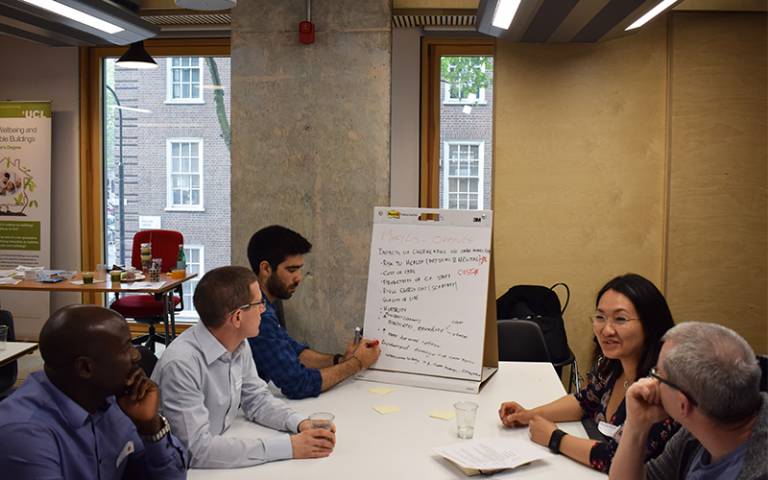Co-creation workshop on the climate change adaptation of care homes
30 August 2018
Climate change poses unprecedented challenges to our built environment.

The frequency and magnitude of extreme heat events will increase with catastrophic impacts for public health, communities and the economy. The distribution of climate-related disadvantage varies geographically, as a function of the interplay of public health policy, sociodemographic and environmental factors. The most severely affected are elderly, socially isolated individuals, and people suffering from cardiovascular and/or respiratory diseases, depression or low mobility. Built environment factors also modify heat vulnerability appreciably, with highly glazed, south/west oriented, top-floor, purpose-built flats located within Urban Heat Islands at highest risk. Climate proofing of buildings occupied by vulnerable people and, in particular, care homes is an urgent need. Evidence-based tools to assist in event response are required.
The Bartlett Synergy Grant funded project ‘Mapping Climate Disadvantage for London's Care Provision’ was led by Dr Anna Mavrogianni and Dr Rokia Raslan from the UCL Institute for Environmental Design and Engineering (IEDE), Dr Adam Dennett from the Bartlett Centre for Advanced Spatial Analysis (CASA) and Eleni Oikonomou from the UCL Energy Institute and ran from September 2017 to July 2018. The overarching aim of this interdisciplinary project was to accelerate the development of equitable responses to climate change for care provision in urban environments, with a focus on overheating risk using Greater London as a case study. A co-creation workshop took place on 10th May at the Bartlett with great success. Its aim was to facilitate two-way communication between the research team, policymakers and practitioners from the areas of public health and emergency care, planning, energy, environment and sustainability, local governance, and community stakeholders. More than 60 participants joined the workshop and contributed to active discussions.
Preliminary results of ongoing work under this research project were disseminated and built environment, spatial analysis and public health experts were invited to share their knowledge during the first part of the workshop, which included the following talks:
- Prof Paul Wilkinson, Professor of Environmental Epidemiology, London School of Hygiene and Tropical Medicine: Temperature and health, and the modifying effect of the built environment
- Prof Rajat Gupta, Professor of Sustainable Architecture and Climate Change, Oxford Brookes University: Lesson learnt from the JRF project ‘Care Provision fit for a Future Climate’
- Prof Lee Chapman, Professor of Climate Resilience, University of Birmingham: The impact of urban heat on the most vulnerable segments of the population and critical infrastructure in urban environments
- Dr Gina Cavan, Senior Lecturer in GIS and Climate, Manchester Metropolitan University: Green infrastructure, climate resilience and the built environment
- Kirk Rushby, Architect, Archetype: Passivhaus, climate ready extra care – A case study
The second part of the workshop included breakout sessions that explored the current evidence base on overheating risk in care and extra care settings, identified knowledge gaps and barriers to the implementation of effective heat management and climate change adaptation of the adult social care sector, and ways to overcome them. The objectives of this session were to share ideas and collect expert and stakeholder feedback relating to the development of equitable responses to climate change for ageing and elderly populations, share best-practice knowledge for the mitigation of overheating risk in care homes with social care providers, outline required changes to existing inspection processes, map the potential costs associated with such risks and identify possible future partner collaborations.
 Close
Close

